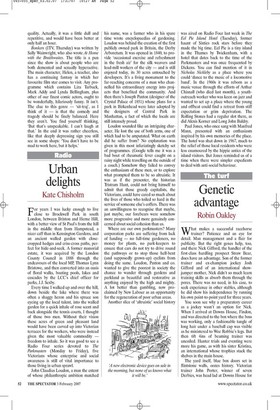Something for nothing
Simon Hoggart T caught The Antiques Roadshow (BBC1, 1 Sunday) almost by accident the other day. It was one of those moments when you're too lazy to turn the television off, you flip through the numbers on the remote, and there it is. Comfort viewing for Sunday evenings. It is 28 years old now, almost an antique itself. 'You can just see where someone has added a new presenter, but it's an Aspel, so it's in keeping with the period. And look at the workmanship on those camera angles. You don't often find quality like that on television these days . . . '
The programme became iconic 11 years after it began, when the BBC took it off to show Nelson Mandela leaving prison. The switchboard was overwhelmed. Oliver Pritchett wrote a funny piece in the Telegraph (I quote from memory): 'And we interrupt our coverage of Nelson Mandela's release to bring you the news that Mrs Ethel Gamage's 19th-century coal scuttle could be worth as much as £150.'
The show is greed made genteel. The money shot, as they say in Hollywood, is the look of gratified — occasionally covwww.spectator.co.uk etous — astonishment when someone learns that the old jigsaw is worth £600, or that they should put a reserve of £5,000 on a painting that's been in the attic for 30 years. Like all shows that deal with members of the public, it is ruthlessly manipulative. Notice the envious crowds looking on when the expert discusses the glazed vase which cost £4.95 in a charity shop and might be worth £1,500. Their miserable knick-knacks, old jewellery boxes and walking sticks weren't worth anything like enough, or didn't have a fascinating back story. (My great-grandfather rescued it before Krakatoa exploded. But I think it's an ugly old thing, myself. .
In the past they showed the odd disappointment. 'No, I'm afraid the factory in Birmingham turned these things out by the thousand. I'd send it to your next bring-andbuy sale.' Unless I missed one, these moments have been ditched. If someone brings in their fake Chinese paperweight, as they did last week, and learns that it might be worth four quid, then you know that their porcelain creamer is going to be valued at £1,000. I wonder if the experts' claims are ever tested. Usually people insist that they would never dream of selling; they just want a valuation. But what happens if it goes to auction and nobody bids? Or, promised two grand, they actually raise two hundred? Do disgruntled participants have a website on which to complain?
Look at the daytime schedules and you'll see that, apart from reruns of detective dramas, there are only games, property programmes and a bewildering variety of antiques shows almost all based on the premise that you can have something for nothing, but morally, because it's yours to sell. AR is still the grandfather of them all, and I suspect will still be going when someone brings along the first artefact that was made after it began. (Oh, look, a very early Pac-Man cartridge. Look at that lovely exterior moulding. How long has this been in the family?') Boris Johnson got into trouble for being rude about Jamie Oliver last year, though why being dismissive of a TV presenter should be defined as a political 'gaffe' I have no idea. Perhaps it's because the lad has now taken on a saintly air. The grave respect once accorded our royal family and even politicians has now transferred to some television stars. He takes those who had nothing, and ushers them into the kingdom of celebrity chefdom. In his father's house, there are many kitchens. The participants in Jamie's Chef (Channel 4, Wednesday) included, we were solemnly told, a drug addict and a car thief, rather like the riff-raff and lowlife saved by that earlier prophet 2,000 years ago. There is a great deal of hugging, as if Jamie is physically passing his spirit into them. Even his swearing has taken on a certain liturgical quality. Actually, it was a little dull and repetitive, and would have been better at only half an hour.
Bunkers (ITV, Thursday) was written by Sally Wainwright, who also wrote At Home with the Braithwaites. The title is a pun since the show is about people who are both demented and sexually hyperactive. The main character, Helen, a teacher, also has a continuing fantasy in which her favourite film star comes to visit. Any programme which contains Liza Tarbuck, Mark Addy and Lynda Bellingham, plus other of our finest comic actors, ought to be wonderfully, hilariously funny. It isn't. The clue to this genre — `sit-tray, as I think of it — is that the comedy and tragedy should be finely balanced. Here they aren't. You find yourself thinking, 'But that's unspeakable. I can't laugh at that.' In the end it was rather cheerless, like that deeply depressing sign you still see in some shops: 'You don't have to be mad to work here, but it helps.'





















































 Previous page
Previous page